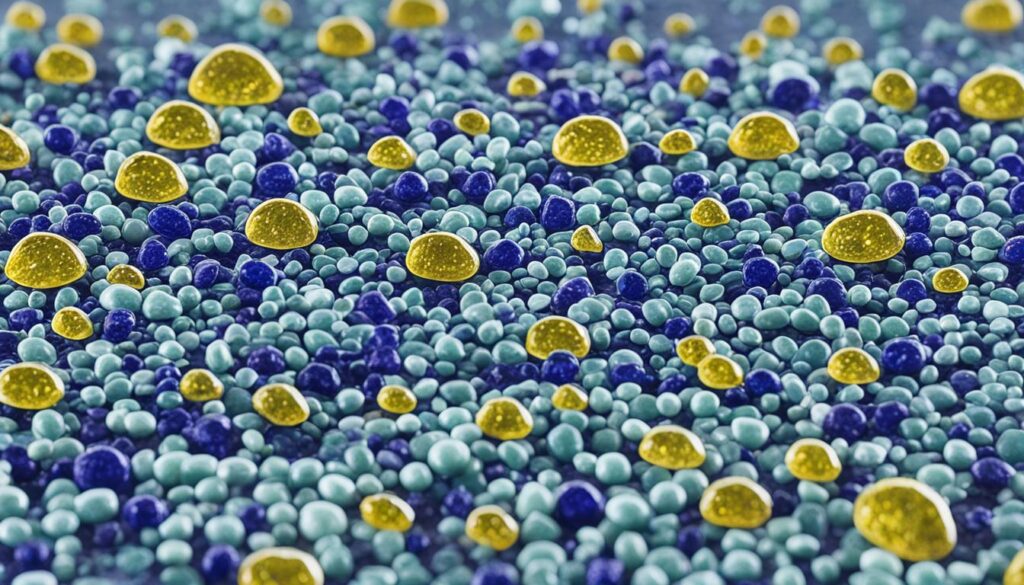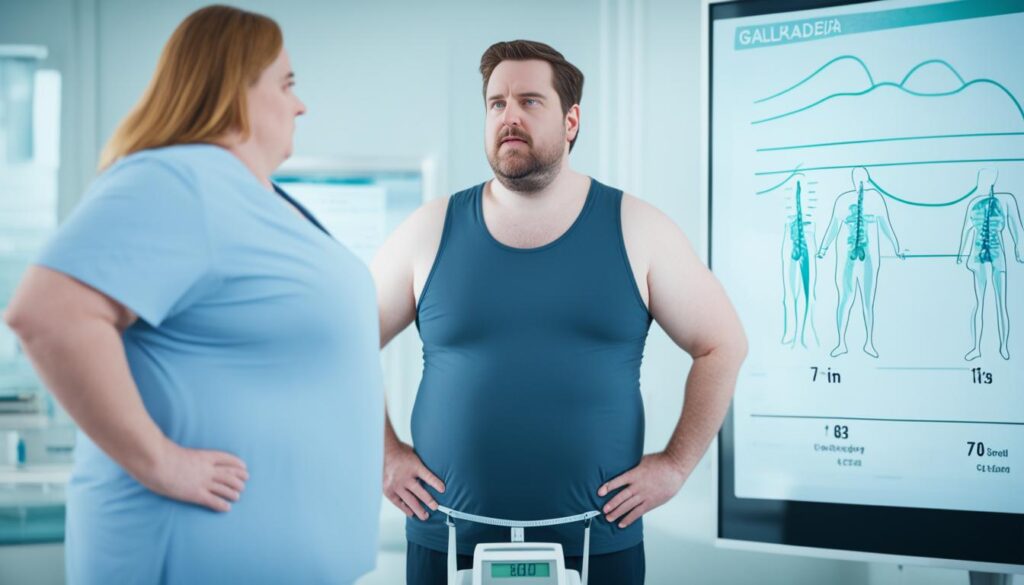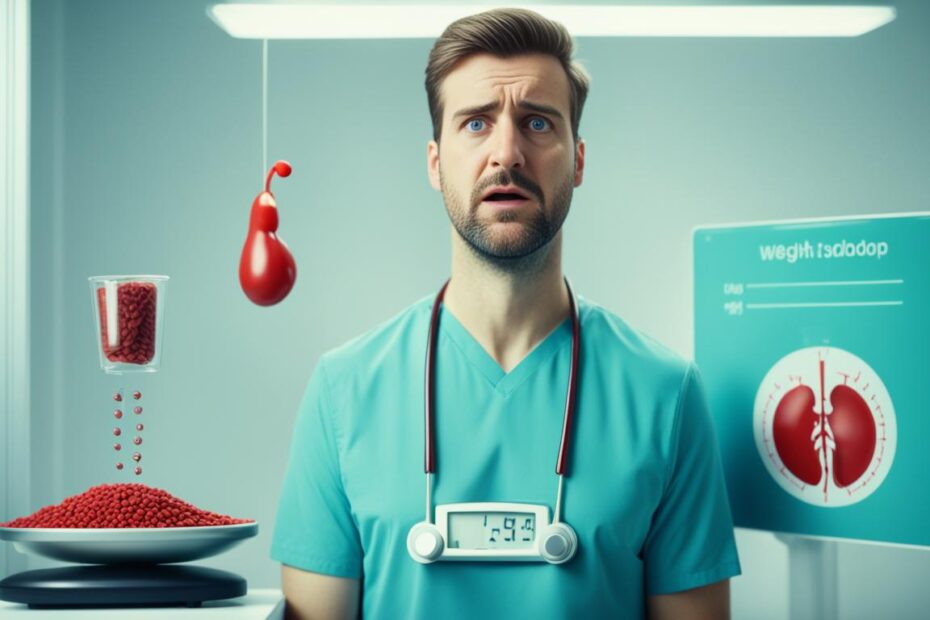Many people wonder about weight loss and gallbladder problems. It’s a big question that we need to talk about. Losing weight can change how well our gallbladder works in ways that might surprise you.
Losing weight fast could make gallstones more likely. But being overweight is already a risk for gallbladder issues. So, it’s a bit of a puzzle. This article will look at how losing weight can affect your gallbladder. We will also talk about the risks and how to care for your gallbladder while losing weight.
Understanding Gallstones and Their Formation
Gallstones are a common health issue, impacting many Americans. Let me explain what they are, how they form, and the symptoms to look for. This info is key for keeping your gallbladder healthy.
What are gallstones?
Gallstones are hard deposits in the gallbladder. They vary in size, from tiny grains to golf balls. There are two main types:
- Cholesterol stones: These happen with too much cholesterol in bile
- Pigment stones: They form in people with specific health issues
How do gallstones form?
Bile hardens and becomes stone-like to create gallstones. There are things that make you more likely to get them:
- Being a woman (women get gallstones more often)
- Age over 60
- Being overweight, especially around the waist
- Losing weight fast or going up and down in weight
- Some medications or health problems

Common symptoms of gallstones
Many with gallstones don’t feel any symptoms. These “silent stones” might not need treatment. But if symptoms show up, they might include:
- Severe upper belly pain
- Feeling sick and throwing up
- Your skin or eyes turning yellow (jaundice)
If you feel these symptoms, talk to a doctor soon. Finding and treating them early can avoid problems and keep your gallbladder healthy.
The Link Between Obesity and Gallbladder Issues
I’ve found that obesity and gallbladder disease often go together. Being overweight can be tough on your gallbladder. This can lead to painful gallstones. Let’s look at how extra weight can harm your gallbladder.

Being obese messes up your gallbladder. It changes how much cholesterol, lecithin, and bile acids mix. This mix-up makes gallstones more likely. When you have more weight, your gallbladder can’t empty right. This leads to more cholesterol bile and stone formation.
But it’s not just your weight that matters. Where you store fat is important too. If you have a big belly, you’re in more danger of gallstones than if you carry fat on your hips or thighs. It shows us that your body shape is key.
The good news is losing weight can protect your gallbladder. By dropping those extra pounds, you lower your gallstone risk. It’s great for your whole health and your gallbladder’s health too.
- Obesity increases gallstone risk
- Excess weight disrupts bile balance
- Belly fat is more dangerous than hip or thigh fat
- Weight loss can lower gallstone risk
It’s very important to understand the link between being obese and gallbladder problems. It makes me want to keep a healthy weight, not just for looks. But to keep our gallbladder happy too. So, a good weight is good for you and your gallbladder.
Can Weight Loss Cause Gallbladder Problems?
Weight loss can affect your gallbladder in many ways. I’ll look into how losing weight can hurt your gallbladder health. We’ll also talk about what to watch out for.
Rapid Weight Loss and Gallstone Formation
Losing weight super fast might cause gallbladder troubles. If you’re losing over 3 pounds each week, your gallbladder might not work right. This can make gallstones more likely to form.
Studies found that losing weight fast makes you three times more likely to get gallstones. This is compared to those who lose weight slowly.
Weight Cycling and Gallbladder Risk
Going up and down in weight, or yo-yo dieting, can be bad for your gallbladder too. People who gained and lost 10 to 19 pounds had a 31% higher chance of needing their gallbladder removed.
Those that changed weight by 20 pounds or more had a 68% higher chance. Keeping your weight steady is key for a happy gallbladder.
Bariatric Surgery and Gallbladder Complications
After bariatric surgery, there’s a risk of gallstones due to losing a lot of weight quickly. This is more likely in the first three to six months.
Doctors might tell you to take ursodiol to help prevent gallstones. It’s very important to follow your doctor’s instructions after surgery.
To keep your gallbladder safe, lose weight slowly. Try to lose only ½ to 2 pounds each week. Make sure to get enough protein and some fats in your diet. This can help lower the risk of gallstones.
It’s not just about losing weight. It’s about staying healthy. This includes taking care of your gallbladder.
The Impact of Low-Calorie Diets on Gallbladder Health
Low-calorie diets can harm your gallbladder, especially if you lose weight too fast. Very low-calorie diets (VLCDs) are even worse for your gallbladder than low-calorie diets (LCDs). A study found that people on VLCDs were 3.4 times more likely to get gallstones needing hospital care than those on LCDs.
Rapid weight loss is tough on your gallbladder. For every 92 people on a VLCD, one got serious gallstones. Shockingly, 61% of those needed their gallbladders removed.
Gallbladder sludge from fast weight loss is another risk. Cutting calories a lot makes the body add more cholesterol to the bile. This can turn into sludge or small stones. Research finds that 10 to 25 percent of VLCD dieters get gallstones. About a third of them need surgery.
If you’re losing weight, do it slowly to help your gallbladder. Try to lose 1/2 to 2 pounds a week. Eat some healthy fats to keep your gallbladder working well. Also, keep moving. Exercise can make your chance of getting gallstones 25% less. A balanced weight loss plan is best for both your health and your gallbladder.
Safe Weight Loss Strategies for Gallbladder Health
Losing weight the right way is crucial for your gallbladder. Here are some tips to lose weight safely.
Recommended Pace for Healthy Weight Loss
Don’t rush your weight loss; it might lead to gallstones. Aim for losing 0.5 to 2 pounds every week. This helps avoid gallbladder issues and builds good habits.
Balanced Diet for Gallstone Prevention
Eating well is key for weight loss and preventing gallstones. Add these foods to your meals:
- Fresh fruits and veggies (5 servings daily)
- Whole grains
- Low-fat dairy
- Lean proteins
- Foods with lots of fiber
Stay away from foods high in fats, cholesterol, and sugar. Try baking or grilling instead of frying to cut down on unhealthy fats.
The Role of Physical Activity in Gallbladder Health
Exercise is a must for losing weight and keeping your gallbladder healthy. Try to get at least 150 minutes of moderate exercise weekly. Brisk walks, swims, or bike rides are great choices.
Always talk to a doctor before making big changes in diet or exercise. Following these steps will help you lose weight without hurting your gallbladder.
Diagnosis and Treatment of Gallstones
Doctors have a few ways to find gallstones. Ultrasound is usually their first pick. It is easy and shows the stones really well. Sometimes, they might use CT scans or special X-rays too.
Blood tests can also help find signs of gallstones. If you feel sick, seeing your doctor is a good idea.
Now, let’s talk about treating gallstones. Surgery is common. It’s called cholecystectomy. This might seem scary, but people do it all the time. For people who can’t do surgery, there are other options:
- Oral dissolution therapy: Medication to dissolve small gallstones
- Extracorporeal shockwave lithotripsy: Using sound waves to break up stones
Some gallstones don’t need treatment. If they’re not causing issues, your doctor might just watch them. Your doctor will help you pick what’s best for you.
Preventing Gallbladder Problems During Weight Loss
Are you eager to lose weight? It’s important to chat about your gallbladder too. Slow weight loss is best to avoid gallstones. Try losing 1-2 pounds a week. This way, you keep your gallbladder happy.
Eating well is key. Include lots of fruits, veggies, and whole grains. They are full of fiber. Fiber helps stop gallstones. Drink plenty of water too. It’s good for your gallbladder.
Moving more also helps. I suggest 30 minutes of exercise most days. Try walking fast, swimming, or biking. After weight loss surgery, some may need medicine to prevent stones.
Don’t do quick diets or cut lots of calories. They can harm your gallbladder. Make changes you can stick with. And see your doctor regularly. They can help you lose weight safely and keep gallstones away.
